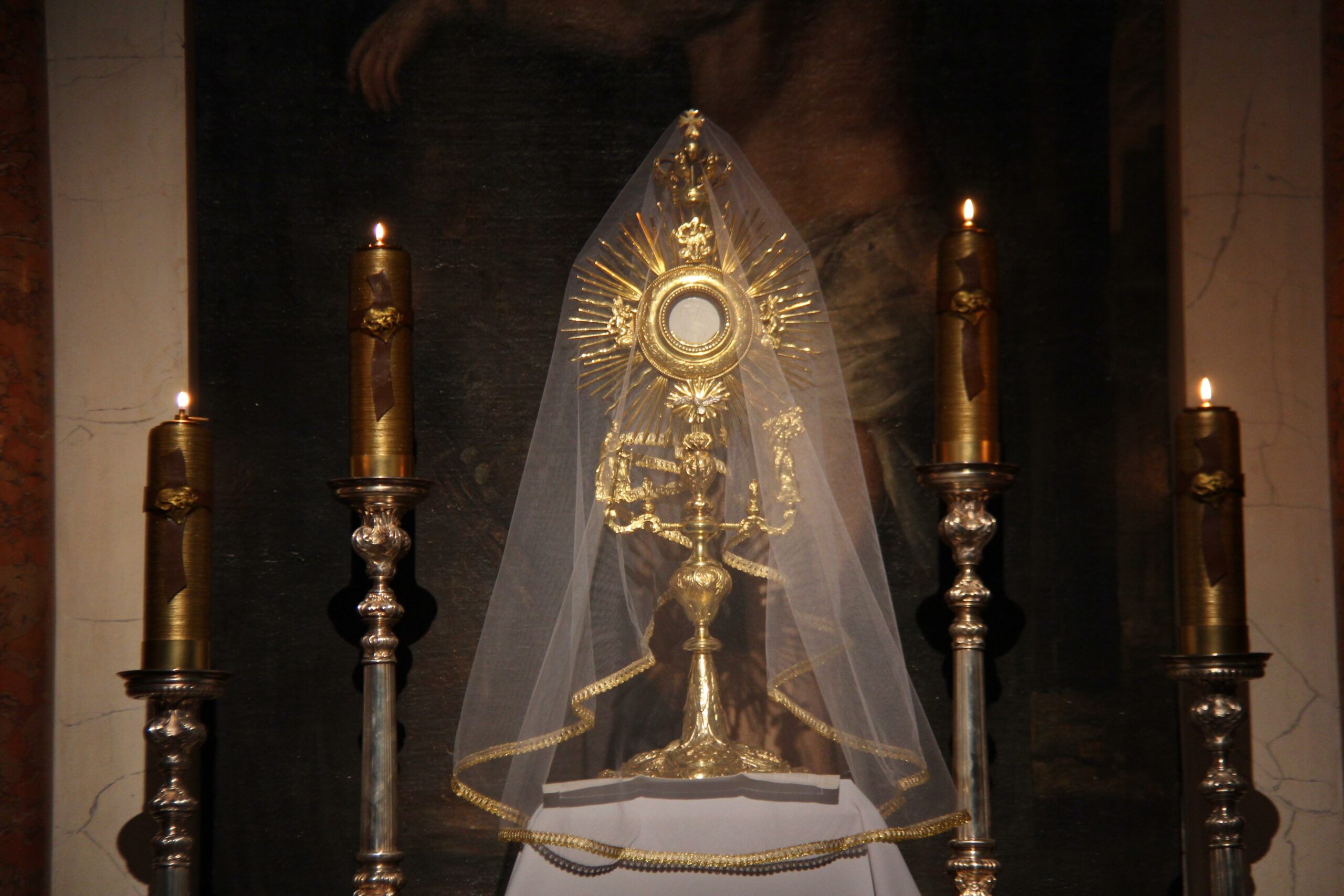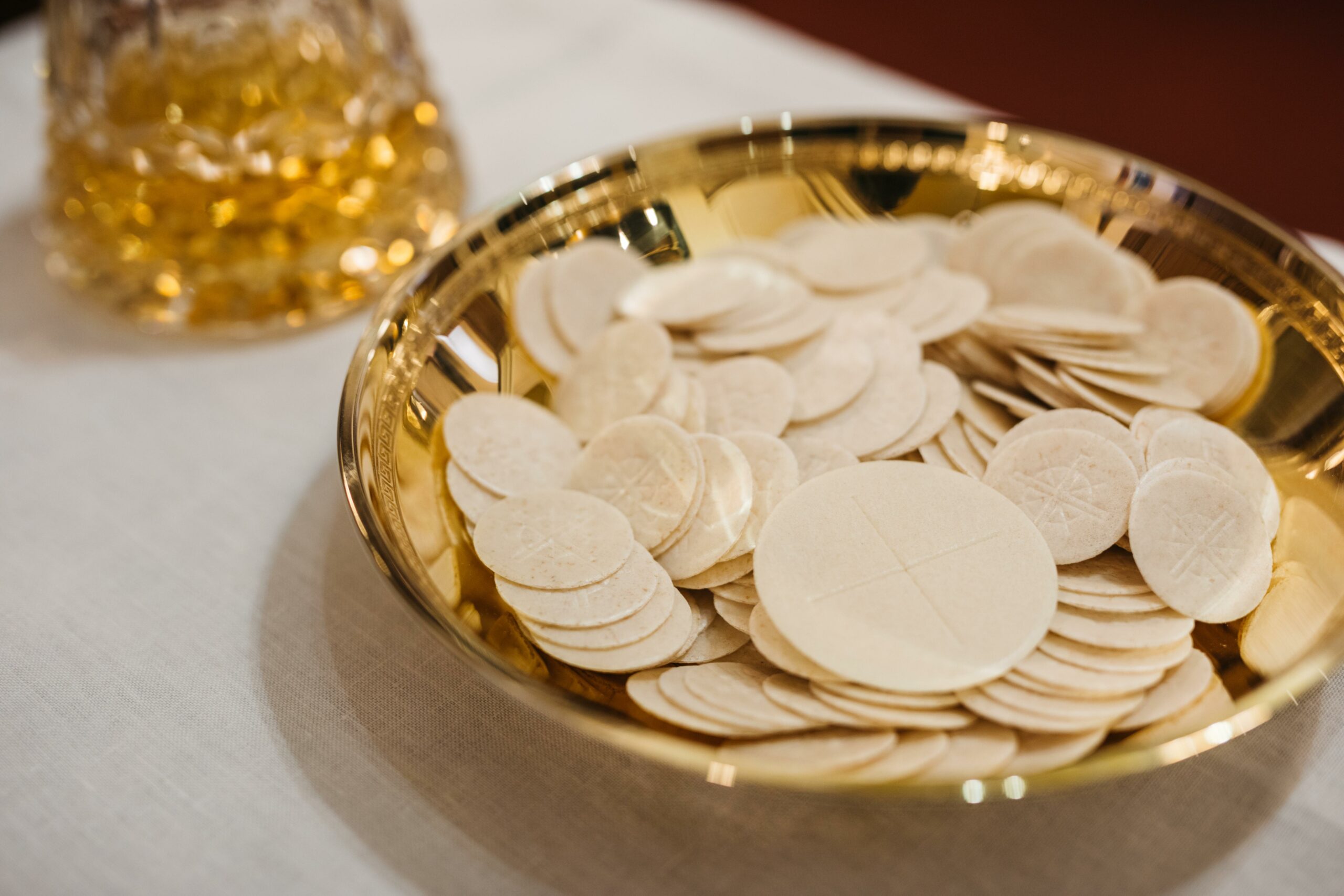Are you ready to embark on a fascinating journey through time? Join me as we unravel the captivating story of the Eucharist, a sacrament that has shaped the beliefs and practices of countless individuals and communities throughout history. In this article, we will delve deep into the annals of religious history, exploring the origins, significance, and transformations of the Eucharist across different faith traditions. Prepare to be captivated by the intricate tapestry of rituals, teachings, and beliefs that have woven this sacred sacrament into the fabric of human spirituality. So, grab a cup of coffee and let’s explore the mesmerizing history of the Eucharist together.

The Journey of the Eucharist: Tracing its History and Significance
[Eucharist history]
The Eucharist, also known as Holy Communion or the Lord’s Supper, holds a central place in Christian worship and theology. Its roots can be traced back to the institution of the sacrament by Jesus Christ during his Last Supper with his disciples. But how did this sacred ritual evolve throughout the ages, and what significance does it hold for believers around the world? Join me on a captivating journey through the history of the Eucharist as we uncover its origins, transformations, and enduring impact.
Origins and Early Development
The institution of the Eucharist can be found in the accounts of the Last Supper, as depicted in the Gospels of Matthew, Mark, and Luke. On the night before his crucifixion, Jesus shared a meal with his disciples, taking bread, giving thanks, breaking it, and saying, “This is my body, which is given for you. Do this in remembrance of me.” He also took a cup of wine, blessed it, and said, “This cup that is poured out for you is the new covenant in my blood.”
In the early centuries of Christianity, the celebration of the Eucharist mirrored the practices of the Jewish community from which it emerged. The influence of Jewish prayer and practice can be seen in the structure and elements of the Eucharistic liturgy. Early Christian communities would gather on Sundays, the day of Christ’s resurrection, to participate in the Eucharist, which involved biblical readings, psalms, hymns, prayers, and the consecration of bread and wine.
Expansion and Ritual Adaptations
As Christianity spread and became more established, the frequency of Eucharistic celebrations began to vary. While initially celebrated on Sundays, the Eucharist gradually became a daily practice by the 4th century. This change allowed believers to partake in the sacramental meal more frequently, emphasizing its central role in their spiritual lives.
Over time, various Christian traditions developed distinct liturgical practices and theological understandings of the Eucharist. Different denominations placed varying emphasis on the Real Presence of Christ in the elements of bread and wine. Some viewed the Eucharist as a symbolic commemoration of Christ’s sacrifice, while others believed in the mystical transformation of the bread and wine into the body and blood of Christ.
The Significance of the Eucharist
The Eucharist holds immense significance for Christians worldwide. It is a sacrament that commemorates the Last Supper and embodies the ongoing presence of Christ in the life of the Church. Through the act of receiving the consecrated bread and wine, believers enter into a profound encounter with the divine, nourishing their faith and strengthening their bond with God and the Christian community.
The Eucharist also serves as a profound symbol of unity among believers. It represents the gathering of the faithful, who, despite their diversity, come together at the Lord’s table to partake in a shared meal. In this act of communion, the barriers of race, nationality, and social status are dissolved, and a sense of unity and equality is fostered.
Looking to the Future
As we reflect on the rich history and deep significance of the Eucharist, we cannot overlook its continued relevance in the modern world. The sacrament continues to inspire worship, foster spiritual growth, and nourish the faith of millions of Christians across the globe. Its power to unite, transform, and connect believers to their spiritual heritage remains undiminished.
Whether one views the Eucharist as a symbolic act of remembrance or a mystical encounter with the divine, there is no denying its profound impact on the lives of believers throughout history. The journey of the Eucharist, from its humble origins in the Upper Room to its present-day practice, stands as a testament to the enduring power of this sacred ritual.
In conclusion, the history of the Eucharist reveals a dynamic and evolving tradition that has shaped the lives of Christians for centuries. From its roots in the Last Supper to its diverse expressions in different Christian traditions, the Eucharist exemplifies the central place of ritual, remembrance, and community in the Christian faith. Its significance goes beyond theological debates and academic discussions, speaking to the hearts and souls of believers who find solace, renewal, and unity in this sacred sacrament.
“Through the centuries, the Eucharist has remained a powerful symbol of Christ’s presence and a source of spiritual nourishment for believers across the globe.”
The history of the Eucharist is rich and fascinating, full of profound symbolism and centuries-old traditions. If you’re curious to delve deeper into this sacred sacrament and uncover its origins, rituals, and significance, follow this link to discover the captivating story of the Eucharist throughout the ages: history of the eucharist. Prepare to be enchanted by the timeless beauty of this ancient practice as you explore its historical journey.
FAQ
Question 1: What is the origin of the Eucharist?
Answer 1: The Eucharist was instituted by Jesus Christ during his Last Supper with his disciples. It holds great significance as a sacrament commemorating this event.
Question 2: How frequently was the Eucharist celebrated in its early days?
Answer 2: Originally, the Eucharist was celebrated every Sunday. However, as time passed, the frequency of its celebration increased, and by the 4th century, it was celebrated daily.
Question 3: How did Jewish prayer and practice influence the development of the Eucharist?
Answer 3: The development of the Eucharist was influenced by Jewish prayer and practice. Elements such as biblical readings, psalms, hymns, and prayers were incorporated into the framework of the eucharistic ritual.
Question 4: What does the Eucharist commemorate?
Answer 4: The Eucharist commemorates the Last Supper of Jesus Christ with his disciples. It represents the sharing of his body and blood, symbolizing the sacrifice and redemption central to Christian faith.
Question 5: What is the significance of the Eucharist in Christianity?
Answer 5: The Eucharist holds immense significance in Christianity as a sacrament that fosters communion with God and one another. It serves as a source of spiritual nourishment, strengthening the faith of believers and fostering unity within the Christian community.
- Sept 31 Myth: Unveiling Calendar Secrets - March 18, 2025
- How Long & Till December 18, 2025: Accurate Countdown Guide - March 18, 2025
- Discover Japanese Artists: A Complete History - March 18, 2025
















